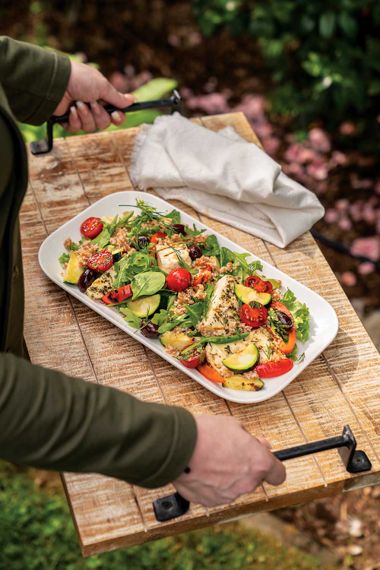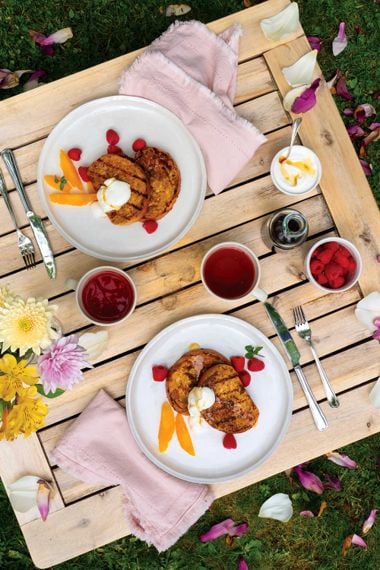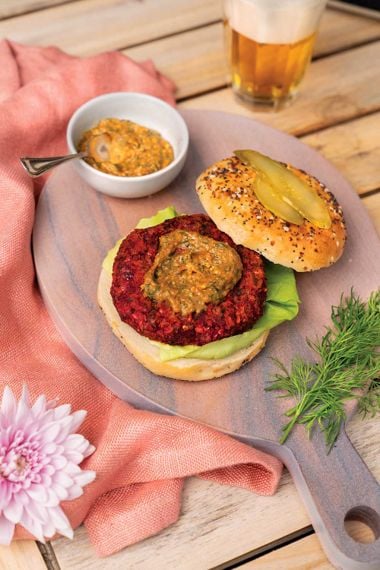Thrill of the Grill
Nothing screams sunny summer like a fired-up grill. As we like to say: where there’s smoke there’s a delicious meal in the works. What better excuse to give the oven a night off and get outdoors than to double down on the grill? Trouble is, it’s easy to fall into a burger and chick fillet rut when cooking al fresco. After one too many pieces of grilled chicken, you might be ready to fly the coop.
So how do you break away from grilling fatigue? Try thinking out of the box when it comes to preparing a feast on the grill. When you have the urge to light a fire, what better way to expand your outdoor cooking repertoire than by turning to the plant kingdom?
Certainly, meat shouldn’t get all the live-fire love. You can also count on grilling to imbue plant-based foods with tantalizing flame-licked flavour goodness. Plus, it’s a sure-fire way to up the nutritional ante of your summer menu.
Ready to think outside the grill marks? These next-level grilling recipes won’t leave you pondering “where’s the beef?”

Halloumi, a Greek-style cheese with a firm, chewy, almost meaty texture that makes it the ultimate—and literal!—cheesesteak option for the grill because it can withstand the soaring heat without melting. The intense heat of grilling also brings out the sweetness of the salad’s red peppers and zucchini, while a tomato dressing brightens up the whole meal. Farro, spelt, and quinoa are good alternatives to freekeh, but you can also make this salad grain free if you prefer.

Bet you’ve never considered making breakfast or Sunday brunch on the grill. Consider cooking your egg-soaked bread over flames as a way to coax even more flavour out of brag-worthy French toast. You can also use slices of brioche bread and whatever fruit happens to be in season. Of course, nobody could fault you for topping it all off with a drizzle of maple syrup. If you want it dairy free, you can use dairy alternatives such as oat milk and coconut yogurt.

Combine pizza and taco night by firing up the grill. Sweet flame-licked onions, melty cheese, fiery salsa, hearty beans, and crispy flatbread crust all marry well in a no-fuss pizza that comes together fast enough to work within the confines of the weekday time crunch. Set up a work area near the grill so you have all your toppings within easy reach and ready to go. You can also use large Middle Eastern-style pitas for your base.
Grill master
Follow these tips for sizzling plant-based grilling success.
Play the field
Remember that a bounty of plant-based foods can benefit from spending time over fire. Everything from cherry tomatoes (skewered, of course) to tempeh and even watermelon and Tuscan kale leaves are contenders for grill time. Tofu, eggplant, and zucchini have never found a grill they didn’t love.
Knife play
Be sure to slice vegetables such as potatoes and bell peppers large enough so they don’t fall through the grill grates and so they’re easy enough to move around on the grate.
Rub it down
Prevent flare-ups, reduce sticking, and keep grill debris off your food for safe and tasty backyard cooking. Use a long-handled grill brush to clean your grill grates immediately after use while they’re still warm. For good measure, you should also brush your grill off again after preheating it for your next meal.
Tool of the trade
Long-handled tongs are ideal for moving around items such as tofu and vegetables on the grill without getting you too close to the fire.
Hot stuff
Preheat your grill for at least 10 minutes. That way, food will sizzle as soon as it hits the grates and it’s less likely to stick to very hot grill grates. If you can hold your hand about 5 in (13 cm) over the grill for two to four seconds, the fire is at a high heat (450 to 550 F/230 to 290 C).
Oil slick
To grease a hot grill grate, use a brush with heat-resistant silicone bristles or a wad of paper towel dipped in oil and rubbed on the grate using tongs. Never use cooking spray on a hot grill.
Crowd control
Leave room to spread your food out. Stuffing your grill grate with too much in the way of proteins and veggies makes it less likely everything will cook evenly. It also makes it more difficult to flip items and move them around if flare-ups occur.
Seal shut
The more you open your grill lid, the longer it will take to cook dinner. The grill can lose around 50 F (10 C) every time the lid is opened. Covered cooking is the best practice because it uses convective and direct heat to cook the food faster and more evenly.







